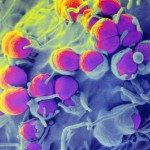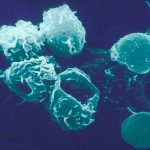Link to Pubmed [PMID] – 16641258
J. Virol. 2006 May;80(10):4656-63
Dendritic cells (DC) are suspected to be involved in transmissible spongiform encephalopathies, including bovine spongiform encephalopathy (BSE). We detected the disease-specific, protease-resistant prion protein (PrP(bse)) in splenic DC purified by magnetic cell sorting 45 days after intraperitoneal inoculation of BSE prions in immunocompetent mice. We showed that bone marrow-derived DC (BMDC) from wild-type or PrP-null mice acquired both PrP(bse) and prion infectivity within 2 h of in vitro culture with a BSE inoculum. BMDC cleared PrP(bse) within 2 to 3 days of culture, while BMDC infectivity was only 10-fold diminished between days 1 and 6 of culture, suggesting that the infectious unit in BMDC is not removed at the same rate as PrP(bse) is removed from these cells. Bone marrow-derived plasmacytoid DC and bone marrow-derived macrophages (BMM) also acquired and degraded PrP(bse) when incubated with a BSE inoculum, with kinetics very similar to those of BMDC. PrP(bse) capture is probably specific to antigen-presenting cells since no uptake of PrP(bse) was observed when splenic B or T lymphocytes were incubated with a BSE inoculum in vitro. Lipopolysaccharide activation of BMDC or BMM prior to BSE infection resulted in an accelerated breakdown of PrP(bse). Injected by the intraperitoneal route, BMDC were not infectious for alymphoid recombination-activated gene 2(0)/common cytokine gamma chain-deficient mice, suggesting that these cells are not capable of directly propagating BSE infectivity to nerve endings.







